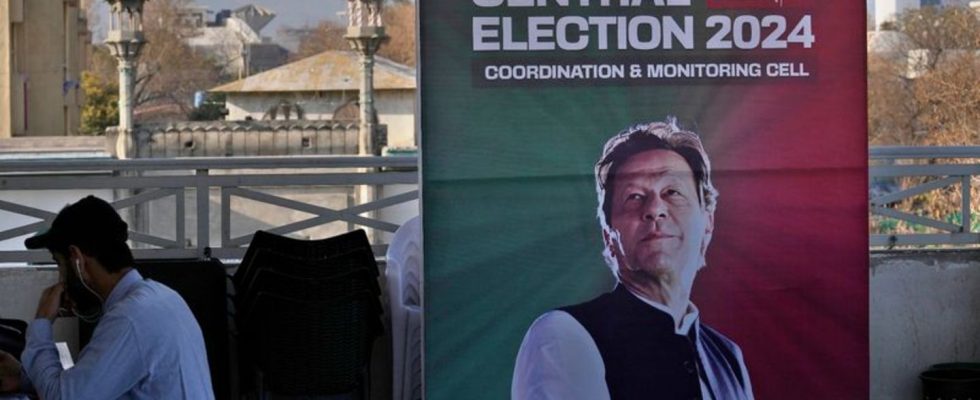Choose
Pakistan: Independents surprisingly strong in parliamentary elections
The imprisoned ex-Prime Minister Imran Khan and his opposition party PTI are currently ahead in the parliamentary elections in Pakistan. The counting of votes is still ongoing. photo
© Anjum Naveed/AP/dpa
Against all expectations and despite massive intimidation, the opposition was able to score points in the elections in Pakistan. It is completely unclear who will govern the nuclear power in the future.
In second place was the PML-N of three-time Prime Minister Nawaz Sharif, who was recently considered the favorite, with a good 28 percent of the seats. The evening after the election, his party was confident of victory and hoped for an absolute majority. The People’s Party PPP with its 35-year-old top candidate Bilawal Bhutto Zardari got around 22 percent. Most recently, in the country with more than 240 million inhabitants, the PML-N and PPP were in a broad government coalition with a PML-N prime minister following the overthrow of Imran Khan by a vote of no confidence.
Pakistan now faces a difficult task of forming a government. The PML-N and PPP are also likely to court the favor of the independent candidates. Pakistani politicians have repeatedly changed their loyalties in the past. Around 130 million eligible voters in the nuclear power were called upon to vote on the distribution of power in the National Assembly and the provincial parliaments.
Internet blocks and allegations of manipulation
Weeks before the election, political experts and human rights activists denounced unfair election conditions because of the crackdown on the opposition. Due to internet blackouts on election day and massive delays in counting votes, the PTI complained of manipulation. The Interior Ministry justified the shutdown of the mobile networks with the alleged security for voters.
The next government faces major challenges
A long list of challenges awaits the new government. Terrorist attacks, an ailing economy with high inflation of almost 30 percent and the consequences of climate change. The World Bank also recently curbed expectations for the economy of the country with 240 million inhabitants, which has experienced an upswing in recent decades but only recorded minimal growth after the corona pandemic and the devastating floods in the summer of 2022. The country suffers from high levels of social injustice and religious extremism. The population is largely disillusioned by the power struggles of the political leadership.
Sharif primarily relied on populist positions in the election campaign. The businessman promised to stimulate the economy, reduce electricity prices and create ten million jobs within five years. Bhutto Zardari had sharply attacked both the imprisoned Khan and Sharif. The party made the severe economic crisis a campaign issue and promised to release political prisoners. Climate change was also an issue for the party. The province of Sindh, a stronghold of the PPP in the south, was particularly affected by the flood disaster in 2022.
Tense security situation – tensions with neighboring countries
In terms of foreign policy, the next government is also likely to focus on the relationship with the Taliban, the new rulers in neighboring Afghanistan. Militant groups have been gaining strength again in recent years, above all the Pakistani Taliban (TTP), which despite ideological proximity operate independently of the rulers in the neighboring country. The relationship with rival India is also tense. With a multi-billion dollar economic corridor, the South Asian country has become deeply dependent on China.
South Asia expert Michael Kugelman told the German Press Agency that Pakistan’s most important partners and donors in bilateral relations with Islamabad would continue to rely on the military, which they see as an important interlocutor. “It doesn’t matter who wins the election.”

